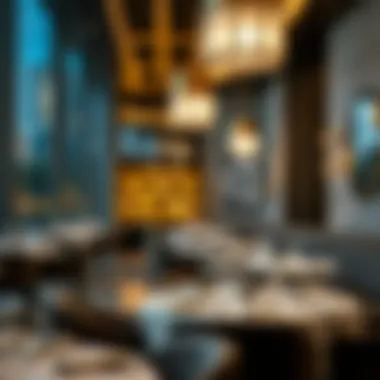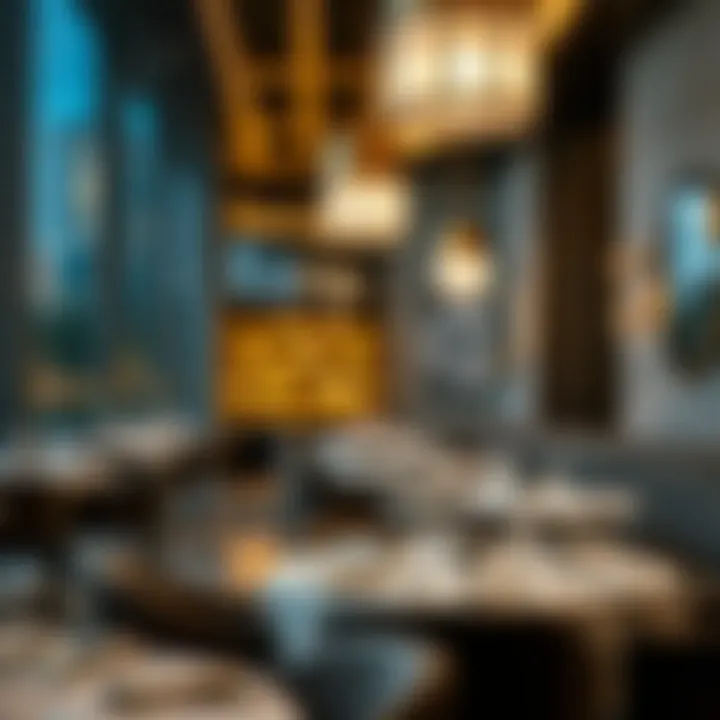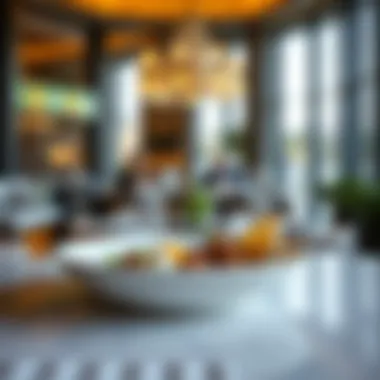Discovering Dubai's Top Michelin Star Restaurants


Intro
Dubai’s culinary landscape has made considerable waves on the global stage, boasting an impressive medley of Michelin-starred restaurants. This article aims to shine a light on the artisans behind these dining experiences, as well as the evolving dynamics that define Dubai’s gastronomic excellence. High-quality dining often intertwines with urban luxury, which holds significant appeal for investors and property seekers alike.
The real estate market in Dubai doesn't merely revolve around traditional properties; it encompasses a lifestyle that includes the finest in culinary offerings.
Market Trends and Insights
Current Market Conditions
The restaurant scene in Dubai is a vibrant tapestry of flavors and cultures. Global influences meld with local ingredients, creating an enticing environment for culinary innovation. With various international chefs setting up shop in the emirate, competition remains fierce, making it essential for establishments to continually elevate their offerings. As of 2023, the scene reflects a progressive shift toward sustainable dining practices and more personalized experiences. Consider this:
- Installations of seasonal menus that focus on local produce.
- Increased engagement with food ethics among unfamiliar diners.
- Pop-up experiences that celebrate global cuisines.
Such trends suggest that Dubai is not standing still. The city is continually adapting and fostering an atmosphere where culinary artistry can thrive.
Future Predictions and Projections
Looking to the future, experts expect the Michelin star count in Dubai to rise. With initiatives that promote culinary tourism, the focus is increasingly on unique experiences that cannot be replicated elsewhere. International chefs are likely to gravitate towards the emirate, driven by its strategic location and affluent clientele.
Investment in extraordinary dining experiences is seen as a lucrative path. The future may hold:
- A more diverse range of cuisines represented.
- Increased partnerships with local farmers and producers to enhance freshness of offerings.
- Greater emphasis on multi-sensory dining experiences, where the surrounding environment plays a critical role in the meal.
"Investors must realize that the relationship between culinary excellence and real estate value cannot be overstated; they often go hand-in-hand in attracting a discerning clientele."
Culinary Tourism and the Real Estate Connection
Culinary tourism has become an undeniable driver of Dubai’s appeal. Patrons often seek out Michelin-starred meals when exploring the city, inadvertently raising the profile of surrounding neighborhoods as prime real estate locations.
With ramifications like these, it's crucial for investors and developers to keep an eye on emerging culinary hotspots, as these can signal potential growth areas for residential and commercial properties alike.
As the dining scene reaches new heights, the properties nearby become increasingly desirable. Therefore, the intertwining of fine dining and luxurious living stands as a pivotal aspect of Dubai’s real estate attractiveness.
Prolusion to the Culinary Scene in Dubai
Dubai has undergone a remarkable metamorphosis in the culinary arena over the past few decades. Once rooted in traditional Middle Eastern fare, the city today blossomed into a melting pot of flavors, thanks to its diverse population and the vibrant expatriate community. The culinary scene now not only attracts food lovers from across the globe but also serves as a beacon for investors and property seekers intrigued by this luxurious lifestyle.
An Overview of Michelin Stars
Michelin stars are more than just shiny accolades; they symbolize excellence and culinary artistry. The awarding of these stars by the esteemed Michelin Guide garners immense prestige, making it a coveted recognition among chefs and restaurateurs alike. In Dubai, the excitement surrounding Michelin stars only amplifies the city’s desire to elevate its dining experience. The impact of Michelin stars not only enhances a restaurant's reputation but also drives tourism and boosts local economies. With each star awarded, Dubai positions itself on the culinary map, drawing attention from global food enthusiasts who seek top-tier dining experiences.
"A Michelin star can transform a restaurant from a hidden gem to a culinary landmark."
The Rise of Fine Dining in Dubai
Fine dining in Dubai has blossomed like a flower in spring, revealing a dazzling array of options that cater to every palate and preference. High-profile hotels and luxury establishments have recognized the potential for upscale dining, leading to the creation of innovative menus combining culinary traditions and modern techniques. As the city continues to evolve, so does the diversity of its dining options; you can now find flavors from across Asia, Europe, and beyond, coexisting in harmony.
Moreover, the rising affluence of residents and an influx of tourists enriches this gastronomic quest for luxury. Many new restaurants position themselves as experiential dining, where the ambiance and service are as integral as the food served. This shift toward fine dining aligns perfectly with Dubai's image of luxury and sophistication, making it a pivotal consideration for investors exploring the synergy between culinary experiences and real estate opportunities.
In this rapidly changing landscape, it’s clear that Dubai’s culinary scene is not just about pleasing the palate but also about creating an allure that encapsulates a lifestyle choice. With this new culinary direction, the crossover between dining experiences and attractive investment opportunities continues to grow.
Criteria for Michelin Star Recognition
Understanding the criteria that lead to Michelin Star recognition is crucial for grasping the true caliber of dining experiences in Dubai's fine dining scene. These criteria not only set a benchmark for culinary excellence but also guide both chefs and investors in realizing what it takes to attain this prestigious accolade. Michelins stars are not simply given; they are earned through dedication, skill, and a commitment to quality that resonates deeply within the dining establishment.
Quality of Ingredients


At the very heart of Michelin’s evaluation is the quality of ingredients. This encompasses a wide array of factors such as sourcing, freshness, and seasonality. Michelin inspectors look for restaurants that prioritize high-quality, sustainable ingredients. This may mean selecting local produce or importing rare items, but the end goal remains the same: to create dishes that stand out in taste and presentation.
The emphasis on ingredient quality not only elevates a dish's flavor profile but also reflects the restaurant’s broader philosophy regarding sustainability and responsible sourcing. When diners experience a meal crafted from the best ingredients, they can truly tell that thought and effort have gone into its preparation.
Skill of the Chef
No kitchen can shine without a talented chef at the helm. The skill of the chef is paramount in the Michelin recognition process. Inspectors assess not just technical ability, but also creativity and innovation. A chef's ability to harmonize flavors and present dishes in an artistic manner can make or break a restaurant's reputation. For instance, a dish that may seem simple at first glance can gain complexity through the chef's unique cooking methods or unexpected flavor combinations.
Additionally, the chef's training and experience play a role in this evaluation. Many Michelin-starred chefs have undergone rigorous training in esteemed culinary schools or have apprenticed under other Michelin-starred chefs. This refined skill set allows them to continuously push the boundaries of what fine dining can offer.
Consistency in Culinary Excellence
Another critical aspect in the Michelin evaluation is consistency in culinary excellence. A single outstanding meal is one thing, but diners expect the same level of quality every time they return. Michelin inspectors often visit a restaurant multiple times, under different circumstances, to gauge whether a restaurant can reliably deliver exceptional experiences.
This highlights the restaurant’s commitment to high standards, not just on busy weekends but on ordinary weekdays too. Michelin-starred restaurants must maintain an unwavering dedication to their craft, ensuring that every dish that leaves the kitchen not only meets expectations but exceeds them consistently. It is this consistency that builds loyalty among diners, contributing to the restaurant's long-term success and stature in the culinary landscape.
The essence of Michelin Star recognition lies not only in culinary innovation but also in the unwavering pursuit of excellence.
Notable Michelin Star Restaurants in Dubai
When discussing the gastronomic highlights of Dubai, the mention of Michelin star restaurants carries a weight that speaks to both prestige and culinary mastery. These establishments do more than just satisfy hunger; they weave stories through intricate flavors and artistic presentations. In a city where culinary innovation blends with cultural richness, Michelin star restaurants stand as a testament to the heights that fine dining can achieve. This section will delve into the notable restaurants that have earned this coveted recognition, shedding light on what makes them exceptional, and exploring the experiences they offer.
Prelims to the Michelin Star Landscape
The landscape of Michelin stars in Dubai is a vibrant tapestry, reflecting the diversity of cultures and cooking styles present in the city. Dubai first entered the Michelin world in 2022 with several restaurants being honored. This new introduction to the Michelin guide provided a significant boost to the culinary scene, elevating the status of local chefs and driving a keen interest from food lovers worldwide. The distinction between one, two, or even three stars emphasizes the level of excellence chefs achieve.
Michelin stars signify not just quality food but also an experience. From the moment one steps into the restaurant, the ambiance speaks volumes. A Michelin-honored restaurant in Dubai typically features:
- Exceptional service that anticipates needs before even they are expressed
- Innovative cuisine that fuses traditional methods with modern techniques
- A commitment to quality that involves sourcing local ingredients whenever possible
This introduction sets the stage for how Dubai's culinary scene is blossoming and attracting international literally through inventive dishes and impeccable dining experiences.
Restaurant A: Culinary Highlights
At the forefront of Dubai's culinary excellence is Nobu, distinguished for its unique blend of traditional Japanese dishes with Peruvian influences. The bespoke atmosphere is complemented by signature dishes like the black cod miso and yellowtail jalapeño. Nobu offers a dining experience that is not just about eating but engaging with culinary art.
Diners are often encouraged to explore menu options, made to cater to a range of palates, ensuring everyone walks away with a memorable experience. Seasonal menus further enhance the allure of Nobu, showcasing the freshest ingredients that the region has to offer.
Restaurant B: Signature Dishes Explored
Next in line is Zuma, a contemporary Japanese izakaya-style restaurant renowned for its chic vibe and energetic ambiance. Zuma's signature dish, the roasted black cod marinated in miso, is beloved by both locals and tourists. The dish, served with a delicate balance of sweet and savory, exemplifies the meticulous crafting of flavors that defines a Michelin star meal.
Aside from the black cod, the here comes their spicy tuna roll, an excellent choice. It's a delightful combination of textures that keep diners coming back for more. Ultimately, it’s the culmination of ingredients and creativity that sets Zuma apart in Dubai’s bustling food scene.
Restaurant C: The Dining Experience
At.mosphere, situated on the 122nd floor of the Burj Khalifa, offers an unparalleled dining experience where views match the culinary offerings. The restaurant is not just about the food; it's about the whole experience of dining at the top of the world. Their tasting menu features dishes such as truffle risotto and Wagyu beef, prepared with precision and flair.
Every element, from seating to service, works seamlessly to ensure that visitors feel like they’re indulging in a chef’s personal journey. The ambiance changes from day to evening, providing varying perspectives of the city that are equally captivating.
Restaurant D: A Blend of Cultures
La Petite Maison brings Mediterranean dishes to life, fusing French culinary art with a dash of Middle Eastern flair. Here, the star dish is their seafood tagine, which reflects a deep respect for the cultural exchange that defines Dubai. The ingredients are robust, the flavors, bold, and the presentation, a feast for the eyes.
This blend of cultures is a hallmark of Dubai's dining scene, and La Petite Maison embodies this perfectly. Diners are taken through a journey where each bite tells a story, showcasing the city’s ability to honor its traditions while inviting foreign influence.
Restaurant E: Innovative Concepts


Il Borro Tuscan Bistro, an Italian gem in a luxury development, focuses on sustainability and authentic Tuscan recipes. The menu is an evolving narrative, with dishes crafted from organic ingredients sourced from their farm in Italy. Standout items, like the handmade pici pasta, demonstrate the restaurant's commitment to remaining true to Tuscan roots while marrying local tastes.
The restaurant also focuses on immersive experiences, where diners can witness the art of traditional Italian cooking firsthand, making it not just a meal, but a culinary adventure.
In summary, the notable Michelin star restaurants in Dubai reflect a rich tapestry of flavors and cultures, presenting an enriching culinary journey for investors and food enthusiasts alike. Each restaurant on this list is a beacon of quality and innovation, inviting explorers to immerse themselves in the exquisite world of fine dining.
The Role of Chefs in Michelin Recognition
In the world of fine dining, chefs assume the role of both artists and alchemists. Their influence stretches far beyond just preparing dishes; they are the heartbeat of the restaurant, embodying the vision, creativity, and passion that can lead to Michelin recognition. Understanding how a chef's expertise and approach impact a restaurant's status helps shed light on Dubai's emerging culinary scene. This section dives into the brothers-in-arms of gastronomy, examining how the right blend of skill, innovation, and attitude can elevate a dining experience to Michelin-star quality.
Chef Profiles: Influencers of Taste
The life story of a chef often reads like an adventure novel, peppered with unexpected turns and transformative experiences. From humble beginnings to culinary greatness, each chef has their unique path, contributing to the character of Michelin-star dining in Dubai. Not only do their culinary skills matter, but their personalities and life philosophies infuse the dining experience with a certain flavor most patrons might not even consciously register.
For instance, take Zuma’s chef, Rei Masuda, who is known for his seamless integration of traditional and contemporary Japanese influences infused with local ingredients. Or Noble Souq’s head chef, who deftly marries Middle Eastern aromas with Western techniques, translating cultural narratives onto a plate. Their backgrounds and individual stories help shape restaurant menus, establishing an enticing blend of flavors that caters to the cosmopolitan palate of the Dubai skyline.
In essence, each chef isn’t merely a cook; they are storytellers. Through every dish, they offer a glimpse into their journeys and experiences. This level of engagement elevates the dining experience, attracting not just the local populace but tourists seeking the authentic culinary reflections of the region.
Culinary Education and Training
The journey to culinary mastery starts with education and rigorous training. Chefs often spend years honing their skills in esteemed culinary schools, learning the fundamental techniques that serve as the backbone of their craft. However, it’s worth noting that hands-on experience in diverse kitchens is equally vital. Many Michelin-starred chefs have put in the time—whether in bustling brasseries, high-end establishments, or even under the wing of culinary legends in far-flung countries.
Training often includes a rigorous syllabus focusing on:
- Ingredient Knowledge: Understanding the origin, quality, and pairing of various ingredients.
- Techniques: Mastering both classic and contemporary cooking methods.
- Presentation: Learning how to artfully arrange food on a plate for visual appeal.
Moreover, given the rapid evolution of culinary trends, ongoing education plays a crucial role. Chefs stay updated through workshops, culinary competitions, pop-up events, or even informal collaborations with other chefs. The emphasis on continual learning ensures that the fine dining scene remains fresh and innovative.
As Michelin stars are awarded not just based on food, but the overall experience, it is clear that the influence of a chef goes far beyond the kitchen. They embody the spirit of the restaurant, ensuring consistency, creativity, and, ultimately, comfort for guests.
"A chef is not just a person who cooks; they create experiences that can linger in one’s memory long after the meal has ended."
This conception solidly places the chef at the center of Michelin recognition, affirming that their influence is as potent as the dishes they create.
Reservation Insights for Michelin Star Dining
The culinary scene in Dubai is a tapestry woven with spices, techniques, and cultures. However, indulging in this vibrant panorama often starts with a reservation at one of its Michelin star establishments. Understanding the ins and outs of booking a table can mean the difference between a delightful dining experience and an unfulfilled craving for top-notch cuisine. In this section, we will explore the pivotal aspects of reservations at Michelin star restaurants in Dubai, shedding light on their significance, the best practices, and what to consider.
Optimal Times to Book
When is the right time to secure that coveted table at a Michelin star restaurant? The answer isn’t always straightforward. While some establishments accept reservations months in advance, others may only allow bookings a few weeks out. Generally speaking, aiming for a reservation during weekdays can sometimes offer a slightly more relaxed dining atmosphere, compared to weekends, which can get downright bustling.
Here are a few tips to keep in mind:
- Peak Hours: Dinners are typically more popular than lunches. If you aim to dine on a Friday or Saturday night, it's wise to reserve at least a month prior.
- Special Occasions: Holidays can draw in a crowd, so plan ahead if you want to celebrate a special event among the stars.
- New Openings: When a restaurant first opens, it may be best to try reserving early or during less conventional hours. It’s not uncommon for new venues to book up quickly.
"A stitch in time saves nine"—this old adage rings true when it comes to fine dining reservations.
Navigating Online Reservations
With the digital age at our fingertips, booking a table has never been easier. Most Michelin star restaurants have user-friendly online platforms where you can see availability and make reservations in a few clicks.
Consider these key points when navigating online reservations:
- User Experience: Many restaurants use reservation systems that offer a straightforward, intuitive interface. Familiarize yourself with multiple platforms, as some venues may utilize specific services like OpenTable, Resy, or their in-house systems.
- Confirmations: After booking online, make sure to check your email for a confirmation. Some eateries send reminders 24 hours prior to your reservation, aiding in reducing no-shows and last-minute cancellations.
- Alternatives: If the restaurant is fully booked, don’t give up hope. Many places keep a waitlist. Calling directly can sometimes yield unexpected openings.
By being savvy about the reservation process, you not only secure your spot in some of Dubai's best culinary feats but also set the stage for a memorable dining experience.


Impact of Fine Dining on Dubai's Real Estate Market
The relationship between fine dining and real estate in Dubai grows increasingly significant as the culinary landscape expands. High-end restaurants, especially those with Michelin stars, not only enhance the gastronomic offerings of a city but also serve as magnets for attracting affluent residents and tourists. This intersection of luxury dining and property investment offers many advantages that both buyers and developers should consider when navigating the Dubai real estate market.
Culinary Tourism and Its Growth
Culinary tourism has witnessed a boom in recent years, and Dubai has emerged as a premier destination for food lovers from around the globe. As restaurants earn prestigious Michelin accolades, the city's status as a culinary hotspot grows. Food aficionados often travel to experience unique dining experiences that can only be found in Michelin-starred venues. This influx of visitors translates directly into economic growth and increased demand for both residential and commercial real estate.
Consider the visitors who flock to Dubai's fine dining scene; they frequently seek luxury accommodations and high-end amenities that match their dining experiences. This has led to the development of exclusive residential properties near these esteemed restaurants. Proximity to a Michelin-star establishment can elevate property values significantly, making the surrounding area far more desirable.
- Culinary experiences become an asset for real estate. Homes situated near renowned eateries can fetch premium prices, tapping into the growing culinary tourism market.
- People increasingly regard a vibrant food scene as a vital aspect of urban living, impacting their choice in home purchases.
Luxury Living Proximity to Michelin Restaurants
Living near Michelin-starred restaurants is a trend that resonates deeply with buyers who prioritize lifestyle as much as luxury. Getting to walk a few steps to a world-class dining experience offers an allure that many find irresistible. Investors keen on the Dubai market should look closely at property developments positioned near these culinary gems.
- Well-planned luxury developments often incorporate fine dining options, or at least ensure they're within a stone's throw away, making them more attractive to prospective buyers.
- The appeal of such locales is not purely about the food; it's also about the atmosphere and prestige associated with being part of a vibrant culinary community.
"Fine dining establishments boost the real estate market by attracting wealth and tourism, intertwining gastronomic excellence with property value."
For further information about culinary tourism trends, visit Culinary Tourism. It provides deeper insights into how dining experiences can reshape travel and real estate landscapes.
Future Trends in Dubai's Culinary Scene
In the vibrant tapestry of Dubai's culinary landscape, staying ahead means looking toward the future. There’s more than just flavors at stake; it’s a reflection of the shifting paradigms in dining experiences, consumer preferences, and the very essence of sustainability itself. This section explores the emerging trends that will not only influence Michelin star establishments but also shape the dining culture and the implications on real estate investments in the emirate.
Emerging Culinary Concepts
Dubai is a melting pot of cultures, and this eclecticism finds its way into the dining scene, resulting in emerging culinary concepts that are as diverse as they are innovative.
- Fusion Cuisine: Restaurants are increasingly adopting fusion styles, blending forms and flavors from different culinary traditions—imagine Korean tacos or sushi burritos. This trend offers diners the excitement of unexpected pairings, boosting both creativity and culinary exploration.
- Experiential Dining: As consumers seek more than just a meal, the demand for unique experiences is on the rise. Chefs and restaurant owners are crafting settings where dining becomes an adventure. Think thematic dinners or multi-sensory experiences that transport you to a different world.
- Chef-Driven Concepts: With the rise of celebrity chefs, there’s a shift toward menu design that reflects the personal stories and backgrounds of these culinary artists. Diners, particularly in Dubai, are looking to connect with the ethos and narrative behind their meals.
Sustainable Practices in Fine Dining
Sustainability isn't just a buzzword; it's becoming integral to the fine dining experience in Dubai. The emphasis on sustainable practices not only aligns with global demands for responsible eating but also serves as a powerful marketing tool that differentiates establishments in the competitive culinary market.
- Locally Sourced Ingredients: A growing number of restaurants are prioritizing locally sourced produce. This supports local economies and ensures the freshest ingredients, which often taste better and reduce the carbon footprint associated with transportation.
- Waste Reduction Initiatives: Michelin-starred restaurants are implementing strategies to minimize food waste. This includes creative use of by-products in their dishes and partnerships with local farms for composting. Not only is this beneficial for the environment, but it also reflects a responsible brand image, appealing to environmentally conscious diners.
- Sustainable Seafood: As part of their commitment to sustainability, many restaurants are now focusing on responsible seafood sourcing. Compliance with sustainable fishing practices leads to healthier oceans and ensures that future generations can enjoy culinary delights.
"Increasingly, the choice to dine thoughtfully has become as essential as the choice of cuisine itself. Restaurants that prioritize sustainability are not just appealing to ethics—they’re tapping into a lucrative market that values mindfulness in consumption."
As these trends take root, they not only carve the future of dining in Dubai but also hint at investments in culinary tourism and luxury property developments nearby Michelin-star venues. Investors should keep a keen eye on this evolving narrative, as it could reshape the outlook of real estate in the city.
End: The Interplay Between Cuisine and Investment
When we pull back the curtain on Dubai's culinary scene, we find that the delicate balance between exceptional dining experiences and real estate investment is more than mere coincidental. The presence of Michelin-starred restaurants not only elevates culinary standards but also becomes a magnet for individuals seeking luxury living spaces. In essence, culinary excellence plays an important role in shaping the local economy, enhancing property values, and driving tourism.
The Culinary Appeal as a Selling Point
Restaurants awarded Michelin stars offer more than just food; they present an entire experience. This is crucial because it translates directly into the neighborhoods these establishments inhabit. For developers and investors, the presence of acclaimed eateries serves as a robust selling point. Potential homebuyers often look for properties near these fine dining options, viewing them not just as places to eat but as cornerstones of a lifestyle enriched with culture and quality.
Here are some reasons why culinary prestige boosts real estate appeal:
- Increased Foot Traffic: Michelin-starred establishments draw in tourists and locals alike. This influx often benefits surrounding businesses as well, creating a vibrant community hub.
- Enhanced Property Values: Locations near highly regarded restaurants can experience a marked increase in real estate prices. As demand grows, so too does the allure of living in close proximity to gastronomic delights.
- Cultural Status: Areas with renowned dining options are often perceived as more desirable, attracting high-income residents who value both luxury and quality of life.
In a bustling metropolis like Dubai, where culinary innovation continually reshapes the landscape, restaurants emerge as influencers—not just of palates, but also of property trends.
Final Thoughts on Dining and Real Estate Synergy
As we wrap up this exploration, it becomes clear that the relationship between fine dining and real estate is symbiotic. The upscale restaurants generate interest and desirability in neighborhoods, while the residential developers respond to this demand, creating spaces that embrace the culinary culture.
Investors, homebuyers, and property analysts alike should note the following:
- Dynamic Market Trends: The culinary scene in Dubai is ever-evolving. As new restaurants open and Michelin stars are awarded, market conditions will shift, creating both challenges and opportunities.
- Investment Potential: Tapping into areas with burgeoning fine dining scenes can yield high returns. Investors should keep an eye on upcoming culinary stars as predictors of rising property values.
- Synergistic Opportunities: Developers can capitalize on this trend by designing residential spaces that enhance the dining experience. For instance, incorporating communal dining areas or food courts can further attract residents enamored by gastronomy.















